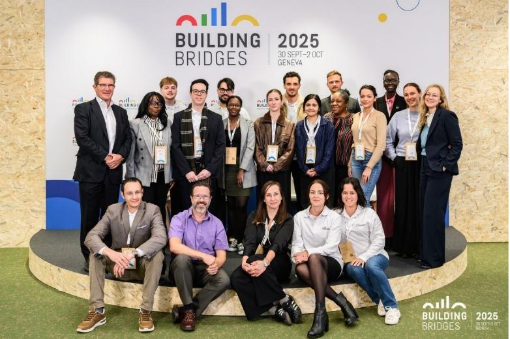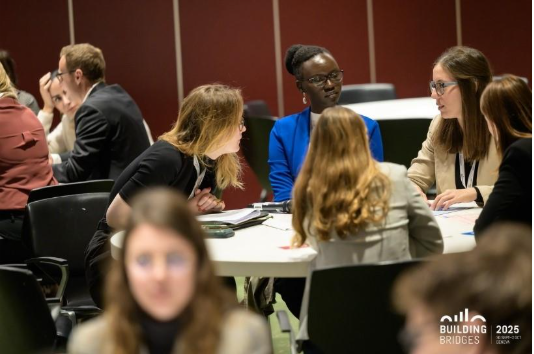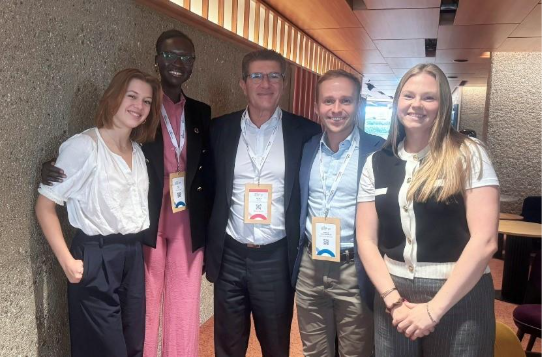By Bella Ato, Junior Professional and ETH Zurich Fellow with the Beyond Lab at UN Geneva
Participating in the inaugural Future Leaders Programme at Building Bridges 2025 offered me a unique opportunity and space to engage with global experts from different fields in finance and sustainability both from the private and public sector.
The programme brought together a multi-disciplinary group of young professionals working at the intersection of finance and sustainability, with the aim of fostering access, inclusion, and leadership among the next generation of professionals.
The three-day programme in Geneva was an eye-opening experience, filled with deep learning and meaningful exchanges with peers and mentors, who helped me sharpen my understanding of sustainable finance and leadership in practice.
Key Highlights
The biggest highlight was meeting with the other Future Leaders. This diverse, passionate cohort of young professionals from impact investing, finance, government and environment, social and governance (ESG) policy backgrounds, left a lasting impression on me. I am proud to have learned alongside such a creative, dedicated group.

Over the course of the conference, I also attended many insightful events. This included the Beyond Lab’s “What’s Next: Accounting for the Future”, which explored how decision-making must systematically account for the long-term impacts of today’s choices. The discussion stressed that we need new policies and finance frameworks attuned not just to short-term gains but to the well-being of future generations. Another session by Pictet Group focused on how intergenerational collaboration can optimize long-term investment decisions – once again underscoring that sustainability demands fairness and resilience across generations. Both sessions stressed that building a better future requires us to look beyond the present, carrying the needs of tomorrow’s citizens into today’s policies and investments.

As part of the Future Leaders cohort, I also benefited from direct mentorship and inspiration on leadership and sustainability from key actors like Patrick Odier, Chairman of Building Bridges. He reminded us of our responsibility to mobilize capital not just for transition but also for repair and restoration of our world.

The summit’s keynote by John Kerry was another highlight. As the former U.S. climate envoy, Kerry urged the finance community to rebrand “ESG” in plain economic terms – “ESG probably ought to mean efficiency, security and growth,” he said. His message was clear: sustainable finance will only gain trust if it delivers jobs, income and stronger economies as well as environmental benefits. Kerry’s optimism, particularly his emphasis on hope and practical action amidst global crises, reinforced for me that leadership in this field must be grounded in courage and conviction.
Key Insights and Takeaways
Across conversations with peers and speakers, a clear set of themes emerged. One central message was that finance must serve people and the planet, not just capital flows. Impact investing stood out as a critical approach to long-term sustainability, in that investments should create measurable social and environmental value, not just financial returns. Aligning profit with purpose is non-negotiable if we want a just and equitable economy and society.
Intergenerational collaboration is essential in all decision-making. Numerous speakers emphasized that today’s policies must account for future generations, treating sustainability as a long-term strategy. This idea resonated with the Beyond Lab’s discussions that underlined the importance of ensuring intergenerational equity, in that current choices don’t “diminish the prospects and rights of those who come after us”. In practice, this means institutionalizing long-term thinking in finance and government, to ensure actions today also serve the wellbeing of tomorrow.
Several practical takeaways also emerged around how sustainable finance can drive systemic change. Blended finance and catalytic capital were highlighted as tools to unlock investment for climate and nature goals, while nature-based solutions were reframed as essential infrastructure. Technology and data innovations were seen as key to improving transparency and reducing risk, and gender equity was emphasized as both a moral imperative and smart economics.
At the closing plenary, we were reminded that sustainable finance is foundational to long-term prosperity. Trust, regulation, collaboration, and courage were named as essential ingredients for unlocking impact, and the call to move from words to investable solutions left us energized to lead with purpose.
Building Bridges Towards a Better Tomorrow
Building Bridges 2025 was a truly transformative experience. It gave me access to high-level dialogues and a rich network of peers and mentors from around the world. Most importantly, it reinforced that sustainability and finance are deeply intertwined drivers of progress: we simply cannot have one without the other if we want an inclusive, resilient future. I returned home more confident, hopeful, and connected.
As a Future Leader, I now carry a clearer vision of how to push my work in development towards systems change. The insights and relationships I gained have enhanced my commitment to advancing sustainability in development: “Through courage, collaboration and care for future generations, we can build bridges to a better tomorrow.”